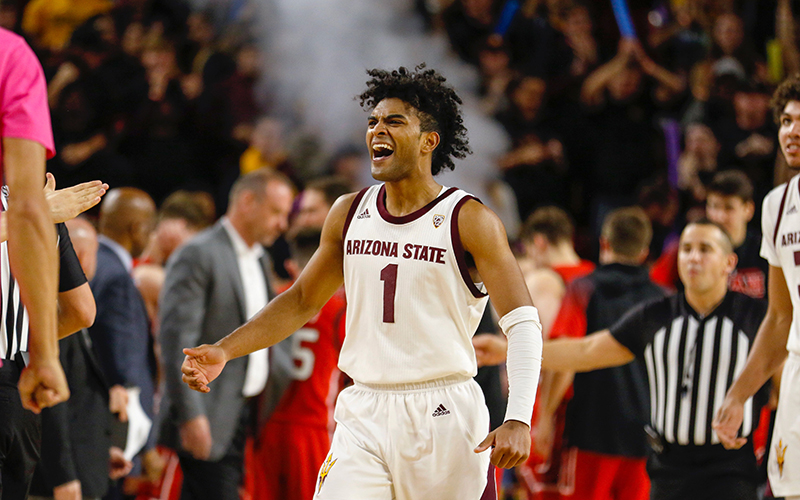
Arizona State’s Remy Martin scored 40 points in a virtual NCAA Tournament that appeared on the Twitter account @CBBSim2020 and was a key player in advancing the virtual Sun Devils to the championship game. (File photo by Brady Klain/Cronkite News)
PHOENIX – The NCAA Men’s Basketball National Championship game was supposed to unfold Monday with more than 70,000 fans watching at Mercedes-Benz Stadium in Atlanta and millions more tuning in on television or streaming the game live.
Instead, March Madness ended before it ever started, wiped out by COVID-19.
But recently, a Twitter account – @CBBSim2020 – appeared that played a virtual version of the tournament utilizing the website whatifsports.com to generate results.
It gave Arizona State basketball fans a reason to get excited during the last couple of weeks as the seventh-seeded Sun Devils emerged as a Cinderella, reaching the faux Final Four by defeating No. 1 seed Gonzaga, 94-76, and downing Louisville, 98-88, in overtime in a national semifinal.
Who was behind this mystery account?
And was it an ASU fan altering the results?
Yes. And no.
“(I’m) not messing with too much, except starting lineups when necessary,” said John Mendoza, a recent graduate of Arizona State’s Walter Cronkite School of Journalism and Mass Communication. “I’ve been changing ASU and having Mickey Mitchell start instead of Taeshon Cherry because that’s what ASU had been going with before the season ended.”
In the end, it was Michigan State that celebrated to “One Shining Moment” after trouncing the Sun Devils 81-60 in the simulated championship game.
Through each round, Mendoza entered the teams and whatifsports.com did the rest.
“The website generates stats and play-by-play, so live tweeting is basically done for me,” Mendoza said.
To make it more interesting for followers, Mendoza tweeted out the simulation’s highlights and results at a pace consistent with actual games rather than post it all at once. He often tweeted out halftime scores and some noteworthy plays as they might take place during a real game. It required some calculating.
“I just found all the game times from last year and figured every game would last two hours with 50-minute halves and a 20-minute halftime,” Mendoza said.
People around the Sun Devils basketball program quickly jumped onboard, making the most out of a difficult real-life situation.
OMG OMG OMG OMG …..Devils are in the freakin Natty!!!! Clearly the best simulation team ever!!! I loved how Remy declared for the draft early in the week and then backs up his decision by dropping 27 in the Final 4 #BobbyF********Hurley https://t.co/rZh3RUOZzX
— Kyle Dodd (KD) (@K_Dodd3) April 5, 2020
I've dreamt of a lot of things in this life…I never thought I'd see this one become a reality https://t.co/poNZwJ6UKQ
— Matt Lively (@mattblively) April 5, 2020
Michigan State came away with a virtual victory over the Sun Devils in basketball, and the Spartans will have to settle for that measure of revenge.
The Spartans have not enjoyed much success in real games against the Sun Devils in recent history. The Sun Devils beat Michigan State twice in football and swept the Spartans in baseball and hockey games over the last year in Arizona while splitting two hockey games played in East Lansing in December.
